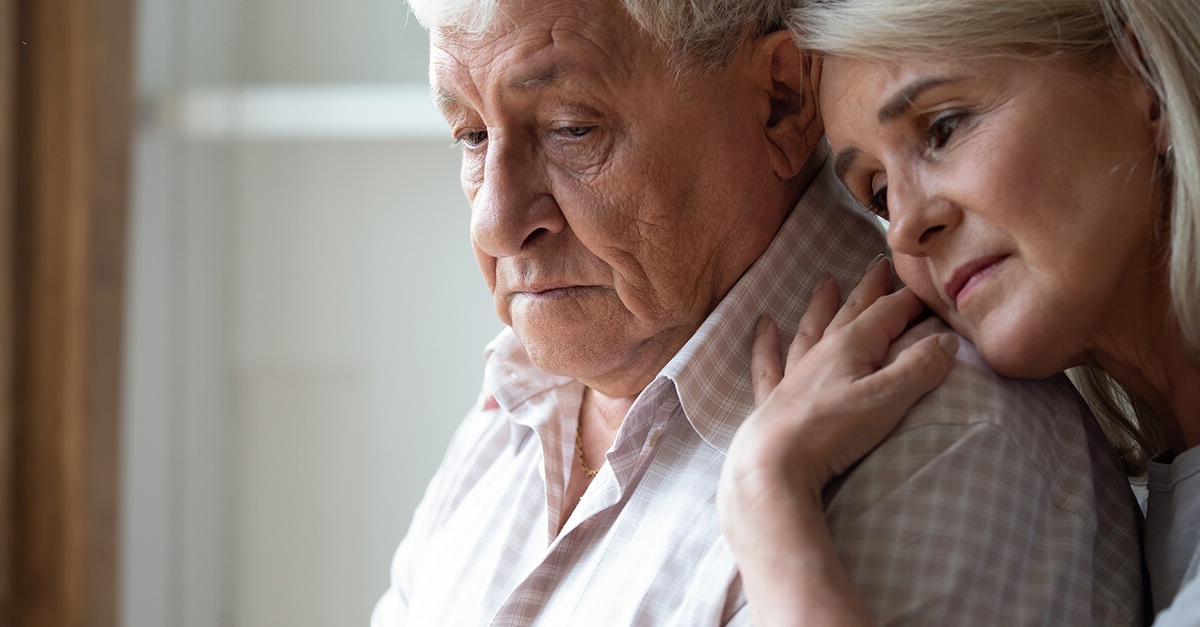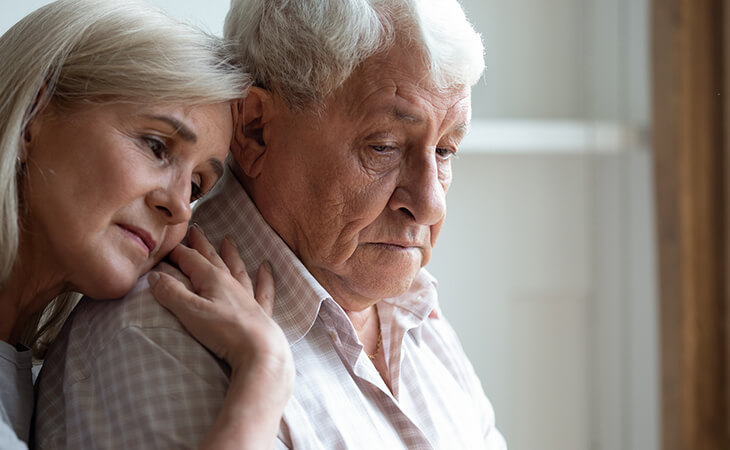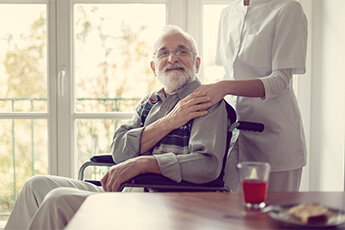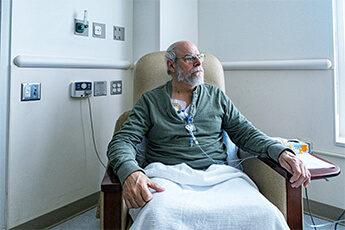How to cope when a loved one has kidney cancer


This year, more than 76,000 Americans will receive a kidney cancer diagnosis. It’s one of the 10 most common cancers that affect men and women. While any cancer diagnosis is upsetting, the prognosis for many people with kidney cancer is generally very good. This is especially true when doctors detect the disease early before it spreads to other parts of the body, becoming metastatic kidney cancer.
Still, it’s hard to watch a loved one go through kidney cancer treatments and manage the side effects. You may experience a range of emotions like fear, anxiety, anger, and sadness. Certain steps can help you — and your loved one — cope.
From the community: “Hi a..just wanted to give a SHOUT out to all fighting with kidney cancer and those fighting with somebody!! Stay strong and don't be afraid to ask your doctor questions , no question is stupid!! Be your own ADVOCATE , you know yourself and how you or your loved one feels. Try drink fluids and get rest!! Prayer and friends help me so much!! We gotta keep fighting TOGETHER!!!” – Inspire member
When someone you love has kidney cancer
It’s natural to want to support your loved one during this difficult time. It’s also OK to need support, too. These tips can help both of you cope:
learn more about kidney cancer
help after kidney cancer treatments
tap into outside resources
From the community: “I am still pretty new here. I am the caregiver for my mom, who is in her early 50's - and has a 6cm tumor on her left kidney. We are still in the discovery phase... All we know so far is the size of the tumor on kidney. Its in the lymph system, and there are a couple of mets on the liver, lungs, and pelvic bone. Making it stage 4. (When I write it down like this it sounds terrible :/ ) The kidney is still in. There have been a lot of discussions between the urologist, oncologist, and surgeon about whether or not it should come out. The urologist is saying it is still functioning and that it should be kept in there, because it will help her body flush out whatever treatment she gets. So we opted to wait on the surgery. Biopsies have come back inconclusive so we don't know the type of cancer yet. The first oncologist we saw said TCC for sure... our new oncologist (Let go of the 1st one)... said that its not TCC and we need to keep doing biopsies till we figure it out…” – Inspire member
Learn more about kidney cancer
The more you understand the disease — including how it uniquely affects your loved one — the more support you can offer. Education can also help ease everyone’s fears. For instance, your loved one’s kidney cancer type (such as renal cell carcinoma) and kidney cancer stage play a significant role in treatment options and prognosis. Staging takes place at the time of diagnosis and any time the cancer returns (cancer recurrence).
More than 2 in 3 kidney cancers are stage 1, which means the cancer affects just one kidney. Survival rates for localized (stage 1) kidney cancer are quite good. It’s estimated that 9 in 10 people with stage 1 kidney cancer are alive five or more years after the initial diagnosis. About 16% of people develop metastatic kidney cancer, which has a five-year survival rate of about 13%.
Help after kidney cancer treatments
Treatment for kidney cancer almost always involves surgery, which is called a nephrectomy. In many instances, surgery gets rid of the disease. Depending on the disease stage, your loved one may get a:
partial nephrectomy to remove just the cancerous tumor, preserving much of the healthy kidney
radical nephrectomy to remove the entire diseased kidney, as well as the adrenal gland, nearby lymph nodes, and some fatty tissue
It can take three to six weeks for your loved one to recover from kidney surgery. For at least the first two weeks, your loved one will need help getting to appointments (they can’t drive) and doing daily tasks like fixing meals. You shouldn’t take on all of this responsibility. Now is a good time to enlist others to drop off meals, shop for groceries, walk the dog, or clean the house. It’s also OK to ask someone to stay with your loved one while you get some needed downtime. You can further aid your loved one’s recovery by making sure they stay hydrated and keeping the kitchen stocked with kidney-friendly foods.
If your loved one is getting other treatments for advanced cancer like radiation therapy or targeted therapies, they may experience side effects. With your loved one’s permission, you can talk to their doctor, nurse, or social worker to gain insight into what side effects to expect, as well as how to assist during the recovery.
From the community: “Hello, new friends. Happy to be able to safely seek support for my dad during the times of Covid... My dad is 61 and is likely facing kidney cancer with metastasis to his lungs (we are awaiting a biopsy that will be done on Tuesday). He has a 12cm mass on his right kidney and “innumerable” nodules in his lungs. Initially, he was scheduled for surgery to remove the kidney but after discovering the nodules in his lungs, the surgery was cancelled and instead, he was sent for a kidney biopsy and to see an oncologist to (likely) begin treatment for immunotherapy. If anyone else has gone though this, will you kindly share what steps you took? How was your initial diagnosis shared by the oncologist? I am so scared of losing him and want to be as well informed as possible. I am reading up on angiogenesis and ways to “starve cancer” but any emotional support is SO welcomed right now. My mom is destroyed over this and my siblings live out of state so I feel very alone coping with the news.” – Inspire member
Tap into outside resources
Depression affects 1 in 4 people with cancer. The stress of being a caregiver and “staying strong” for your loved one can also affect your physical and mental health. You may be more prone to anxiety, depression, and other mental health disorders. As a result, you may have difficulty sleeping, become irritable or impatient, withdraw from others, or get more frequent colds or other illnesses.
Your own well-being is important. And you won’t be much help to your loved one if you don’t take care of your own physical and emotional needs. For help, consider these resources:
Mental health counseling: A psychologist or therapist can provide a safe place for you to talk about your fears and concerns. You can discuss how the disease affects you and your relationship while learning healthy ways to cope.
Palliative care: Palliative care specialists help people manage chronic, lifelong illnesses. It’s not hospice, which is for the end of life. These specialists also support caregivers like you. They can help you learn more about your loved one’s illness, treatments, and prognosis. They can also connect you with supportive services like home healthcare aides, spiritual counseling, and support groups.
Support groups: Talking to friends and family members can be helpful. But you may also find comfort in talking to others who are in a similar situation. You may choose to connect with others through in-person support groups or online networks like Inspire’s Kidney Cancer Survivors Support Community.
Sources
Depression. American Cancer Society. February 2020.
Key statistics about kidney cancer. American Cancer Society. January 2021.
Survival rates for kidney cancer. American Cancer Society. January 2021.
Caregivers taking care of themselves. American Society of Clinical Oncology. September 2019.
Caregiving. Kidney Cancer Association.
Kidney removal — discharge. MedlinePlus. April 2021.
Cancer stat facts: Kidney and renal pelvis cancer. National Cancer Institute.
Support for caregivers. National Cancer Institute. August 2020.
Disclaimer
Member comments are lightly edited for length and to remove identifying information but are otherwise reproduced as they appear in the community as part of public posts.
This content is for general informational purposes only and does not necessarily reflect the views and opinions of any organization or individual. The content should not be used as a substitute for professional medical advice, diagnosis, or treatment. Please consult your healthcare provider about any questions you may have regarding a medical condition.




